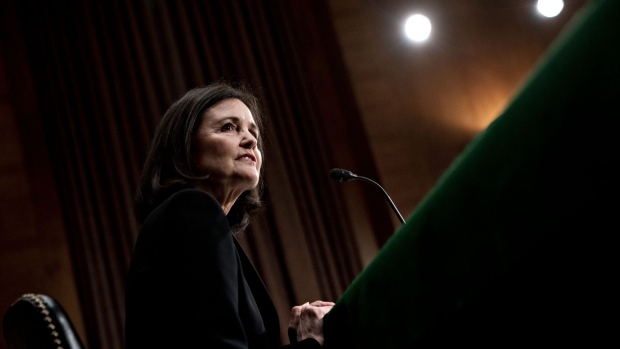Nov 17, 2020
Shelton's Fed nomination is blocked in blow to Trump, McConnell
, Bloomberg News

Judy Shelton’s nomination to the Federal Reserve Board was blocked in the Senate Tuesday, a stunning setback for Senate Majority Leader Mitch McConnell and a blow to President Donald Trump’s drive to shake up the U.S. central bank before he leaves office.
After Covid-19 exposure forced two Republican senators into quarantine, the GOP was left short of the votes needed to overcome united Democratic opposition. McConnell switched his vote to no once the outcome became clear, a tactical move that would allow him to bring the nomination up for reconsideration. That could happen as soon as this week if one of the two quarantining senators can return.
Republican Senators Mitt Romney of Utah and Susan Collins of Maine joined with 47 Democrats and two independents in a 50-47 vote against advancing Shelton’s nomination. Vice President-elect Kamala Harris traveled from Delaware, where she was working with the Biden transition team, to Washington to cast her vote.
McConnell’s plans to confirm Shelton on Tuesday were blown up in the morning when Iowa Republican Senator Chuck Grassley announced he would be in quarantine after exposure to someone who tested positive for Covid-19. He later tweeted that he had tested positive for the virus, which is all but certain to keep him away from Capitol Hill this week.
GOP Senator Rick Scott of Florida announced on Saturday that he was exposed to someone who tested positive for Covid-19 and would self-quarantine.
Grassley and Scott were expected to back Shelton, so the timing of their return could determine whether McConnell will bring her nomination back up.
Although McConnell preserved the ability to bring the nomination before the Senate for reconsideration, the calendar is tight and the vote count doesn’t get easier for Republicans.
Narrow Window
It’s not clear when Grassley and Scott will emerge from quarantine and the Senate isn’t scheduled to work next week with the Thanksgiving holiday on Thursday. Republicans would have to muster another vote before Arizona Democrat Mark Kelly replaces Republican Martha McSally, who he defeated in a special election, when the Senate is scheduled to return after the holiday.
Senator Lamar Alexander, a Tennessee Republican, announced he opposes Shelton’s nomination but wasn’t in Washington on Tuesday. That would leave the Senate at a 50-50 split with Vice President Mike Pence providing the tie-breaking vote. But once Kelly is sworn in, the GOP would be a vote short.
John Thune, the second-ranking Republican senator, said Kelly’s swearing-in will be “a complicating factor here.” After the vote, Thune said “in all likelihood” Senate Republicans will try to vote on Shelton’s nomination again this week.
White House spokesman Judd Deere said the administration continues to support Shelton and remains confident she “will be confirmed upon reconsideration.”
Another GOP senator, Pat Roberts of Kansas, said he was undecided on Shelton just hours before the vote got under way. As the roll was being called, he was vigorously lobbied by GOP colleagues on the Senate floor. Roberts ultimately voted with his party to close off debate to move toward the confirmation vote.
Shelton, 66, a former informal adviser to Trump, was long known for her advocacy of a return to the gold standard, ultra-hawkish views on inflation and opposition to federal deposit insurance. She provoked further controversy and opposition by abandoning those views and calling for interest-rate cuts to align herself with Trump as she emerged as a candidate for a Fed post.
She has also questioned the relevance of the Fed’s mandate, set by Congress, to pursue maximum employment and price stability.
Former Fed officials and a group of prominent economists, including seven Nobel Prize winners, signed letters this year urging senators to reject her nomination.
